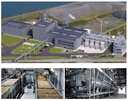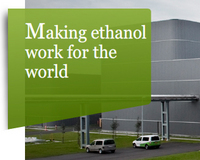Statoil Now Blending Inbicon's Wheat Straw Cellulosic Ethanol for Danish Drivers
SEE ALSO: All Systems Go at the World's Largest Ethanol Plant
FREDERICIA, Denmark - November 4, 2010: As Statoil rolls out a 5% ethanol blend at 100 selected petrol stations across Denmark, Inbicon reported today that it has already begun supplying Statoil with second-generation bioethanol made from wheat straw. Inbicon will be the major supplier of The New Ethanol, as it calls its renewable fuel made from various crop wastes.
"We are very pleased by Statoil's latest step in offering Danish motorists a choice of cleaner, environmentally responsible fuels," says Niels Henriksen, CEO of Inbicon. "And we are proud of the part we can play in supplying fuel made from agricultural waste." The first delivery of second-generation ethanol from Inbicon's plant to Statoil took place in August, with Danish Minister for Climate and Energy, Lykke Friis, participating.
In 2009, the two companies signed an agreement for Inbicon to supply Statoil with the first five million liters of The New Ethanol produced by the Kalundborg plant, where Inbicon's biomass conversion technology is being demonstrated. "With the launch of Bio95 2G we have reached yet another milestone. This is the only gasoline in the market with second generation bioethanol developed and produced in Denmark from Danish straw," says Statoil CEO Pia Bach Henriksen.
 |
The Inbicon Biomass Refinery in Kalundborg opened in November 2009 and has since proven its process at near-commercial scale. The plant can convert 4 metric tons of straw per hour, equivalent to 30,000 metric tons a year. From this 5.4 million liters (1.5 million gallons) of The New Ethanol can be produced a year, along with two other clean, green energy streams.
"We're producing not only The New Ethanol to replace gasoline, but also a clean lignin biofuel to replace coal," says Inbicon CEO Henriksen. "Just as important as our renewable energy products is our renewable energy process. The Inbicon Biomass Refinery can demonstrate dramatically improved efficiencies when integrated with a coal-fired power station, grain-ethanol plant, or any CHP (combined heat and power) operation. Symbiotic energy exchange helps our customers build sustainable, carbon-neutral businesses."
Inbicon is currently working with clients in planning commercial facilities for North America and Asia.
Cellulosic ethanol incentives
 |
A dozen companies, including Inbicon, have announced projects or possibilities for converting cellulose to ethanol or methanol. How close are any to success? Most are still in their labs working on the next new technology breakthrough. Some are in the process of building their first test facility. All hope to build commercial plants to process wood chips, crop waste, or garbage feedstocks into a liquid fuel source.
Inbicon, by contrast, has operated a pilot plant successfully since 2003. We’ve proven the efficacy of our patented processes for converting wheat straw and many other agricultural leftovers to ethanol and various co-products. In 2009, we’ll further demonstrate our capabilities on a large scale (1.4 million US gallons per year) at our demonstration plant at Kalundborg port, including our energy integration system with the adjacent power plant.
Here are some of the incentives that make cellulosic ethanol production attractive to Inbicon and other companies:
1. Consumer and government demands to make fuel from something, anything, besides oil and food is greater than ever.
2. Tighter controls on global warming gases would heighten the appeal of these fuels, since many of them would add little new carbon dioxide to the atmosphere. With Inbicon’s new biomass refinery design, the hydrocarbon footprint will be a minus—in fact, we could feed surplus energy back into the power grid to heat our homes and supplement other manufacturing.
3. Automakers like GM and Ford are building and promoting flex-fuel vehicles.
4. U.S. legislation passed last year mandates the use of 36 billion gallons of biofuels a year by 2022, less than half of it from corn ethanol. Almost all the rest is to come from nonfood sources.
5. There is plenty of agricultural waste to go around:
Wheat Straw:
In 2008/09 world wheat production is projected to reach 656 million tons. The EU-27 is expected to be the world’s largest wheat-producing region with increasing wheat production to 140 million tons. China is expected to be the second largest wheat producer in 2008/09 reaching 109 million tons. Wheat production in the former Soviet Union (FSU-12) is forecast at 99 million tons in 2008/09, up 7 percent from a year earlier. India is projected to produce a record 77 million tons. Canada is around 25 million tons. The US is about 68 million tons. That is up about 20% from last year. 1 ton of grain produces about a ton of straw depending on the height of the variety.
Corn Stover:
Corn yields are about 309,800 million tons in the US. 475,350 million tons are produced worldwide. China produces 156,000 million tons. EU-27 about 59,000 million tons. About 1 ton of corn stover is produced for every ton of grain.
Rice Straw:
In 2008/09 world rice production is projected to reach about 440,000 million tons. The largest are in China with about 130,550 million tons. Next is India at 97,000 million tons. About a ton of straw is produced per ton of rice harvested.
Bagasse:
In 2008/09 world sugar cane production now exceeds 1 billion tons. Brazil produced around 500 million tons. The world production of sugar is already exceeding food demands by almost 10 million tons. Sugar Bagass, the biomass remaining after sugarcane stalks are crushed to extract their juice, accounts for about a third of the harvest.
SEE ALSO: The Auto Channel Fights for the Truth about Ethanol Versus Gasoline
About Statoil
Statoil supplies around one fifth of Denmark's total oil consumption and operates
more than 300 petrol stations in Denmark,
including approx. one fifth automat stations under the 1-2-3 brand. The
company's Kalundborg refinery refines oil products, which are either
exported or sold in Denmark for use as,
for example, transportation fuel or heating oil for private home and
commercial property.
About Inbicon
Inbicon A/S is a pioneer in biomass conversion technology, headquartered
in Fredericia, Denmark. It has proven its
process at pilot plant scale since 2003 and is presently demonstrating it
at commercial scale in Kalundborg. When commercialized for North America and Asia, the Inbicon Biomass Refinery will convert
three clean energy streams into profitable, sustainable, renewable
businesses. Inbicon is a subsidiary of DONG Energy A/S. For information,
go to www.inbicon.com or contact Christian
Morgen, chrmo@inbicon.com.



